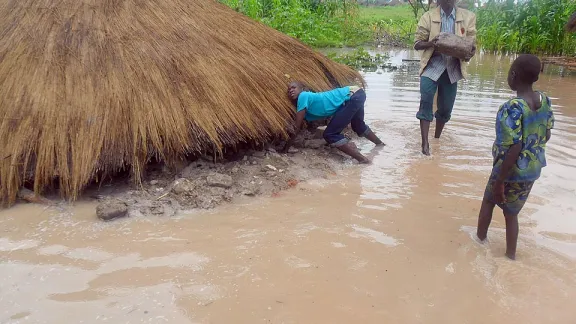
The heavy rainfall and flooding has inundated fields and damaged houses in southern Chad. © LWF/DWS Chad
Refugee Camp to Be Relocated as More Rains Are Expected
Heavy rains in July and August in Chad have caused severe flooding that has damaged crops in the southern region where The Lutheran World Federation (LWF) is managing two refugee camps. The camps will have to be relocated as a result of the catastrophe.
The Chadian government and the United Nations High Commissioner for Refugees (UNHCR), both partners of the LWF, have decided that the nearly 17,000 refugees from the Central African Republic currently living in the Yaroungou and Moula camps will be relocated to a new site nearby.
The LWF will assist the most vulnerable refugees by identifying new sites for planting crops, distributing agricultural tools and seeds and providing medicine for livestock. The camp residents will also receive blankets, hygiene products and support in rebuilding their homes and putting up new shelters.
In Moula camp accommodating 5,600 refugees, some 260 hectares of cropland have been inundated. In Yaroungou, home to 11,200 refugees, the flooding has destroyed 85 percent of the maize or rice crops.
Rainfall of over 1,000 mm in two months in the area has resulted in the destruction of food stock and seeds that would have secured crops for the coming year, and damaged shelters and improved firewood stoves. Poor sanitary conditions have worsened the situation for people living in the two camps, where the LWF Department for World Service works in close collaboration with ACT Alliance, the global network of churches responding to emergencies.
“People are traumatized and don’t know where to go. Some of the women and children are staying at schools and hospitals in the camp. The refugees are suffering from diarrhoea and they don’t have enough food,” says LWF field coordinator Damien Nkindi.
Some of them have started cutting down trees to construct shelters, putting further pressure on already increasing wood consumption as households use fuel wood for cooking.
Heavy rains are still expected in September with the consequence of further flooding and continuous risk of food shortages in the country, which is still dealing with the impact of the severe drought that affected the Sahel region.
The LWF is appealing for donations in order to assist the vulnerable refugees and provide them with food and other basic necessities to survive in this critical situation.


